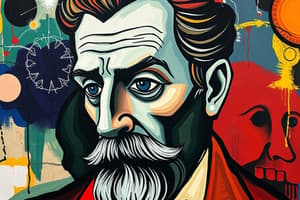Podcast
Questions and Answers
What did Freud suggest is the origin of religion?
What did Freud suggest is the origin of religion?
It arises from the human psyche's need for comfort and security.
According to Freud, what psychological complex is related to religious beliefs?
According to Freud, what psychological complex is related to religious beliefs?
- Freudian complex
- Electra complex
- Oedipus complex (correct)
- Parental complex
Freud believed that religion is purely a positive influence on personal development.
Freud believed that religion is purely a positive influence on personal development.
False (B)
How did Freud view the relationship between religion and civilization?
How did Freud view the relationship between religion and civilization?
What did Freud speculate about the future of religion?
What did Freud speculate about the future of religion?
What term did Freud use to describe belief in God?
What term did Freud use to describe belief in God?
Freud referred to religion as an '_____'.
Freud referred to religion as an '_____'.
Match the following concepts with Freud's views on them:
Match the following concepts with Freud's views on them:
Flashcards are hidden until you start studying
Study Notes
Freud's Critique of Religion
- Freud, the founder of psychoanalysis, provided a complex critique of religion, addressing its psychological roots and societal impacts.
- He viewed religion as a product of wish fulfillment, suggesting it arises from the human psyche's need for comfort amid existential fears, particularly death.
- Freud described religious beliefs and practices as illusions aimed at providing protection, reassurance, and guidance to individuals facing uncertainties.
- The Oedipus complex plays a fundamental role in Freud's critique; he linked religious beliefs to unconscious desires for a father figure, mirroring family authority dynamics.
- He believed religious devotion reflected the relationship between children and their parents, with paternal deities embodying both authority and security.
- Freud categorized religion as a collective neurosis, which alleviates societal anxiety through rituals, myths, and doctrines while inhibiting critical thinking and personal development.
- He posited that religious beliefs stem from human desires and fears, creating a comforting illusion of order in an unpredictable world.
- The belief in a protective God serves to satisfy humans' deep-seated needs for security, similar to a child's dependency on parents.
- Freud explored the intersection of religion and civilization, acknowledging religion's role in cultural development but critiquing its potential to reinforce irrational beliefs and hinder scientific progress.
- He suggested that as humanity evolves and scientific understanding grows, the significance of religious beliefs would diminish.
- In "The Future of an Illusion," Freud argued that religion emerged as a method for early humans to cope with existence's anxieties but would eventually be outmoded by rationality and science.
- He described religious beliefs as artifacts of previous human development, destined to lose significance as society advances.
- Freud criticized religion as an obstacle to psychological maturity and individual autonomy, labeling it an "illusion" and calling belief in God a "universal obsessional neurosis."
- He predicted that humanity would eventually mature intellectually, leading to a diminished need for religious explanations of the world.
Studying That Suits You
Use AI to generate personalized quizzes and flashcards to suit your learning preferences.




